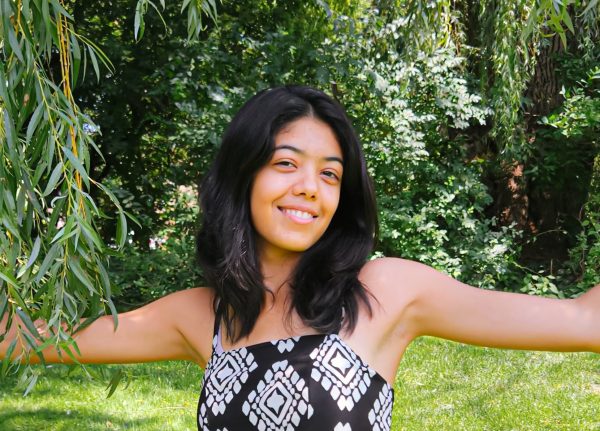For his Science Olympiad event, junior Aiden Platt was tasked with building a catapult that could launch a ball eight meters. Instead, his design could only launch the ball a few inches.
Suddenly, he had a new idea, and once he tested the new catapult with his partner, the ball hit the ceiling—and when they took it outside to see how far the ball could really go, it went over 20 meters, far surpassing their eight-meter goal.
“It was really cool to see it finally work,” Aiden said. “[I felt] very accomplished and happy that we had finally developed something that worked.”
This catapult was a project he was working on for his Air Trajectory event, which he does in addition to Astronomy, Fermi Questions, and Chem Lab.
Throughout the year, he prepares for his events with each of his partners, and recently, he tested his progress with his team at a competition this past Saturday, winning 5th in Air Trajectory and 4th in Astronomy.
Aiden’s Chem Lab partner, senior Rachael Yeager, takes part in the events Experimental Design as well as Write It Do It. She won 2nd and 3rd, respectively, in her events this past Saturday. In the second event, one partner writes instructions for the other to follow in response to a challenge.
“That one takes a lot of teamwork,” Rachael said. “I felt really good because I knew that we both did our part, and we got to where we wanted to be. We do it separately, so there’s no verbal communication. It’s a lot of trust.”
For each of the various Science Olympiad events, competitors work in pairs whether it is build events like the Air Trajectory that Aiden does or study events like Chem Lab that both Aiden and Rachael do. With this inherent interconnectedness, the team has had much time to grow closer.
Competition days have plenty of downtime in between events and tests for the team to bond, leading to many new friendships. With a range of grades together, many of the upperclassmen have taken on a mentorship role. This is especially true since much of the team graduated last year, and many new freshmen joined this year.
“It’s been cool to see the team grow,” Aiden said. “It’s also cool to see a lot of people interested in science because science explains the world. I think people should be interested in science because it explains the things that we might take for granted. Like, we know that we need the sun to survive, but most people might not know how the sun works or how we actually get energy from that. Science shows you that we don’t know a lot about Earth, and it is very interesting to see how we can explore that.”
As the team grows, returning members like Rachael have been able to help newcomers in their events and get interested in science in general.
For Rachael, this is all the more sentimental with this being her final season and having an older mentor of her own when she herself was a newcomer.
“[My first Science Olympiad competition] was actually really scary,” Rachael said. “I remember being super nervous, and I was emailing a senior about it. I was like, ‘How does competition work? What do I do?’ And she was like, ‘Oh, don’t worry. It’s really chill. You’ll be okay.’ And it was actually really fun.”
On top of the support for upperclassmen, the Science Olympiad team has the guidance of several FHC science teachers: Jason Colegrove, Kristy Butler, Natalie Belsito, and Patricia Richardson.
From organizing partners and scheduling to preparing the team with resources and strategies, the coaches are there to help the team and get to see their progress.
“I really like seeing some of the new designs that students come up with and their overall passion for learning about the subject matter,” Colegrove said. “I really like it when I see the students exceed and the pride that they take in all the hard work that they put in.”
The young team has gotten great support from the upperclassmen and the coaches, and now, the time to put their skills and knowledge to the test is coming.
The team starts working in the fall to prepare for the competitions. With another invitational coming up this Saturday, it will be a great chance for the students to further prepare and find areas of improvement before the big competition they’ve all been working up to—Regionals.
“I think it will go well,” Colegrove said. “We’re looking for our 12th year in a row of making States. It’s generally something that we set as our goal at the beginning of the season. And so, I would expect that we continue that streak.”
With the regional competition approaching, the Science Olympiad team is preparing more than ever to succeed.
Even beyond the competitions, from the supportive team to the exciting science, Science Olympiad is a great endeavor for any high school student.
“Do [Science Olympiad],” Rachael said. “Just do it because you don’t really have to have a lot of experience or a lot of knowledge in something really specific. If you’re interested in science, you like building, or you just like doing research and finding more information about stuff you find interesting, then do it for fun. There’s an event for you. Just try it if you want to.”




























































































